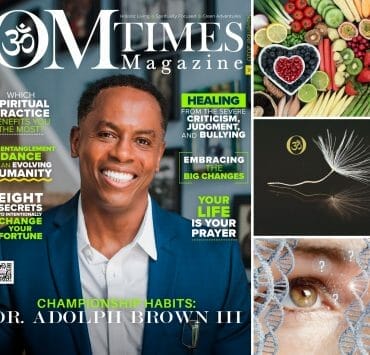Dr. Adolph Brown III: The Championship Habits

Dr. Adolph Brown: One of the most essential life skills is adapting our goals as life isn’t always going to go as planned. Circumstances are beyond our control in the pandemic, so we need to adjust our mindset. Maybe it may take a bit longer to achieve said goal? Maybe it will be achieved in a different way (i.e., virtually vs. in-person)? With setting goals, it’s important to set small actionable steps that can be achieved each day. It’s about consistency, not perfection. Slow progress is progress! I also think the pandemic has given us more free time to focus on our goals. It’s all about perspective!
OMTimes: You’re a highly coveted keynote speaker who travels the world to help others “develop healthy relationships for business, education, and life.” Tell us about your journey to being a successful public speaker.
Dr. Adolph Brown: I don’t consider myself a public speaker. I’m a master teacher who is just sharing my passion for people and learning!
OMTimes: Your keynote speeches range from education to business and industry. What are the 5 aspects that you believe make a great leader? How can business leaders/managers create a positive experience for their employees?
Dr. Adolph Brown: Business leaders/managers can create a positive experience for their employees by leveraging a great leader’s five characteristics. Together, they make up the hallmarks of outstanding leadership.
Empathy is the foundation from which the other characteristics are built. A great leader exemplifies empathy when one attempts to emotionally understand what others feel, see events from others’ perspective, and imagine oneself in the place of another.
When a leader can put oneself in someone else’s position and attempt to feel what they are experiencing – trust, compassion, and understanding are likely fruitful outcomes. As people begin to trust a leader, the leader must demonstrate the second pillar, integrity, or the practice of being honest and having strong moral principles and values. Team members want to work for ethical people. Zig Ziglar once said, “It is true that integrity alone won’t make you a leader, but without integrity, you will never be one.” As the leadership pillars are built, thirdly, it is paramount that the builder has clear actionable and measurable goals for one’s followers. The leader-devised blueprint is only as good as the outcomes. Whether the outcomes are poor or exceptional, a great leader owns the results. Fourth, an accountable leader takes responsibility for the outcomes of decisions and actions along the way. As great leaders are not flawless, every great leader needs to discern for one’s decision-making. This process of self-reflection involves differentiating between what is self-serving and what is beneficial to the greater good. When confronted with a poor decision, great leaders are not afraid to move from self-reflection to self-correction.
Here is the lowdown:
1) Empathy means understanding the needs and wants of your employees. Empathy is the foundation of leading people in a way that is compelling and inspiring.
2) Discernment is the ability to judge a decision well. This means to differentiate between what is self-serving and what is beneficial to the greater good. It also understands the long-term implications of decisions rather than the immediate impact.
3) A leader needs to be a visionary. Being a visionary means setting clear goals and actionable steps to those goals and motivating people along the way.
4) A great leader needs to be accountable. This means that he will deliver when he says he will. An accountable leader takes responsibility for the outcomes of decisions and actions.
5) A great leader needs integrity. Integrity is doing what is right without external accountability. Integrity is the cornerstone of leadership, and it is where your beliefs, morals, and principles align in decision-making.
A business leader/manager can create a productive and positive environment by exemplifying all of these traits. Also, a manager should be receptive to feedback and criticism when necessary.
OMTimes: As a Social Justice Advocate, you’ve discussed the concept of The Empathy Gap. Can you explain what this is, how it works, and how it can help bridge the gap between those who may disagree in political conversations?
Dr. Adolph Brown: Empathy understands another’s experienced by imagining oneself in that other person’s situation. One essentially understands the other person’s experience as if they were experiencing it. Most of us know how to extend sympathy, but empathy brings us closer and closes the distance of concern and identification. The Empathy Gap is the space between individuals where there’s not a bridge of understanding and compassion. The bridge connects the divide. Most if not all of the divides in our society, including health, wealth, education, equity, and equity, did not occur out of thin air; they were built on a foundation of an empathy gap and further contributed to the major breaks in the continuity of opportunities and provisions for ALL people regardless of language, age, race, religion or no religion, education, economic status, disability, and sexual orientation. In the context of political conversations, empathy can potentially disarm a volatile situation. While conversations around political are significantly charged, especially those on opposing sides, empathy can help build a bridge of understanding. Each of us has a unique set of experiences that shape our political preferences. If we were all the same, America would be boring!
OMTimes: You also discuss the concept of Implicit Bias in your keynote speeches. What is implicit bias? How does it work? What can we do to overcome this?
Dr. Adolph Brown: Implicit bias is a set of automatic beliefs we gather in our life through our unique experiences that dictate our everyday decision-making and how we relate to others. The first step to address implicit bias is to recognize and acknowledge that we all have an implicit bias in one way or another. Next, you have to proactively challenge those thoughts (preferably before someone else calls you out on it). To overcome implicit bias, we must see people as individuals. Besides, we must broaden our sphere of exposure by being around people of different backgrounds, ethnicities, and cultures.
Learn more about Dr. Adolph Brown III at his website: https://www.docspeaks.com
Creatrix from Sirius. Fairly Odd Mother of Saints (Bernards). Fish Tank aficionado by day ninja by night. Liane is also the Editor-in-Chief of OMTimes Magazine, Co-Founder of Humanity Healing International and Humanity Healing Network, and a Board Member of Saint Lazarus Relief Fund.





